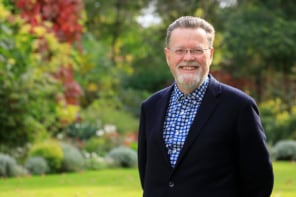James McKenzie celebrates some of the firms that have won business innovation awards from the Institute of Physics over the last 10 years
Whether you’re an academic, a student or someone who left physics many years ago, I’m sure you were drawn to the subject by a simple desire to learn about how the world works. However, as I’ve mentioned many times before, physics is also vital for our modern hi-tech economy. The subject we know and love supports jobs, generates profits and has spawned innovation in sectors ranging from oil and gas to renewable energy, medicine, photonics, IT and more.
It was to celebrate such firms that in 2011 the Institute of Physics (IOP), which publishes Physics World, launched its business awards, which remain the only awards recognizing companies in the UK and Ireland for the innovative application of physics. Over the last 10 years, they have grown from strength to strength. In 2018 a new category was added to honour small start-up firms, while last year the Lee–Lucas award was introduced for early-stage physics-based companies in the medicine and health sectors – thanks to the generous donation by Mike and Ann Lee (née Lucas).
Over the last 10 years, the Institute of Physics’ business awards have grown from strength to strength.
James McKenzie
A total of 13 firms won IOP business innovation awards last year, while more than 65 have been recognized since they were first introduced. And with the 23 April nomination deadline for the 2021 awards fast approaching, this month I’ve picked a few of the winners that caught my eye over the last 10 years. I should add that although I was involved in judging the awards between 2016 and 2020, I have no financial involvement in any of the companies listed below, which I have picked purely as examples of innovative success stories.
Eye-catching entries
An early award-winner was Zephir, which in 2013 was honoured for developing and commercializing a novel lidar anemometry system that could be used to identify where best to locate and build new wind farms. Now known as ZX Lidars, the firm is today a leading provider of wind lidar products and services, with more than 3000 lidar deployments across more than 50 countries.
Another 2013 winner was Simpleware, which was recognized for developing and commercializing a physics-based computer-modelling package that has benefited the aerospace, advanced engineering and medical technology sectors as it allows scanned real-world objects to be integrated with 3D computer-generated models. Its ScanIP software is widely used following the company’s 2016 acquisition by Synopsis – a US-based software firm with $3bn revenue.
Endomag, meanwhile, is a great example of a successful firm growing in the highly regulated medical-physics market. Founded in 2007, its surgical, magnetic-guidance technology had treated some 14,000 patients by the time it won an IOP award in 2016. Endomag’s kit now appears in 550 hospitals in 40 different countries, while its Sentimag equipment has already given 130,000 women access to more precise and less invasive breast-cancer treatment.
Another 2016 winner was Kromek, which supplies radiation-detection components and devices for the medical-imaging, nuclear-power and security and screening markets. Founded in 2003 as a spin-off from Durham University in the UK, Kromek won the award for developing a wireless neutron- and gamma-radiation detection network, which can, for example, warn of radioactive materials being used by “nuclear terrorists”. The company is now a £60m stock-market-listed business with nearly 150 staff at several sites in the UK and US (see “Living in a materials world” in Careers).
I hope my selection of award winners will inspire your company to apply.
James McKenzie
In what with hindsight seems to have been a particularly innovative year, 2016 also saw Tesla Engineering win an award for developing compact superconducting magnets. Its technology allowed a medical cyclotron to be mounted on a gantry – broadening out the use of proton-beam therapy for cancer treatment. Originally founded in 1973, the firm now has more than 250 staff and has also supplied magnets for particle accelerators, fusion systems and MRI machines.
In this first decade of the IOP’s business awards, one firm – MSquared – has won on two different occasions. In 2015 it was honoured for its titanium-sapphire laser technology platform SolsTiS, which had sales of £14m at the time. Two years later it won for its Aurora system, which can image living cells in 3D. The company, which was founded in 2006, has expanded globally using photonics to support quantum technology, biophotonics and chemical sensing.

Achieving innovation
The final company I’d like to mention is Reaction Engines, which won in 2019 for its SABRE aerospace engine. It can provide efficient air-breathing thrust from standstill to speeds above five times the speed of sound in the atmosphere – before operating in rocket mode, allowing spaceflight at up to orbital velocity. Able to “breathe” air from the atmosphere rather than carry its own oxygen, SABRE could make space launches easier and even cut the flight time from the UK to Sydney to four hours. Founded in 1989, it now has 200 staff in the UK and US, with investment from the likes of Rolls-Royce, BAE Systems and Boeing.
In it to win it
One of the challenges that all physics-based firms face is the time it takes to develop products or services and to become globally significant. There’s also the difficulty of explaining a product idea, which is often quite specialized, to potential investors who have little or no science background. That’s why the IOP’s start-up award can come in really handy: it provides small firms with evidence that their technology has had a “stamp of approval” from a judging panel with solid physics and business experience.
I hope therefore that my selection of award winners – and of course there are many that I have left out – will inspire your company to apply. And even if you don’t work in a business, remember the IOP also offers three awards (Katharine Burr Blodgett, Denis Gabor and Clifford Paterson) for individuals or teams who have done innovative physics with a commercial angle. Good luck – and remember, you have to be in it to win it.




